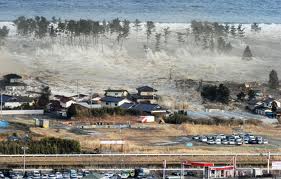
 This earthquake couldn’t have come at a worst time for Japan’s business leaders hoping for a resurgence in the country’s market and economy. Last month, investors put more money into Japanese exchange-traded funds than ony one other area, the U.S. energy sector.
This earthquake couldn’t have come at a worst time for Japan’s business leaders hoping for a resurgence in the country’s market and economy. Last month, investors put more money into Japanese exchange-traded funds than ony one other area, the U.S. energy sector.More than $1 billion flowed into Japan last month, beating out funds focused on agriculture, mid-cap U.S. stocks and large cap growth, according to Biriniyi Associates data. The iShares MSCI Japan (EWJ), the largest of the U.S.-listed funds focused on the country, saw its assets increase by $1.2 billion this year before Friday, according to ConvergEx Group, third among all U.S.-listed ETF assets.
Today, the iShares Japan ETF, which counts Toyota, Honda, Mistubishi Financial and Canon among its biggest holdings, plunged as investors tried to assess the economic damage of the country’s biggest earthquake on record, especially considering the uncertain damage to the Fukushima nuclear plant. Tokyo Electric Power, which runs the plant, is the 10th biggest holding in the fund.
"It will be interesting to see where this money goes," said Nicholas Colas, chief market strategist at ConvergEx group. "Will it go to Asian regional ETFs? Or straight to a safety trade?"
Investors were starting to put money back into Japan on a bet that the third largest economy would benefit from a weakening yen, making its exports especially attractive to countries nearby with surging economies like China.
"The bullish story on Japan consisted of export exposure to the global economy, especially China and the tailwind of a weaker Yen," said Brian Kelly of Kanundrum Capital. "Either the Bank of Japan was going to print Yen, or the dollar was going to strengthen versus the Yen as the U.S. economy improved."
The Bank of Japan said today that it would double the size of its asset-purchase program and put 15 trillion yen into money markets to increase liquidity in the wake of the disaster. Its overnight lending rate is already at about zero.
Also, to many, Japan was a classic contrarian call after the U.S. market had gone straight up for two years, making Japanese stocks seem relatively very undervalued. The S&P 500 SPDR (SPY) is up 70 percent in two years, compared with just a 37 percent gain in the Japan fund.
"As we entered the Fall of 2010, over 50 percent of Japanese stocks were trading below their book values," said Alan Zafran, a partner at Luminous Capital. After all the inflows "it’s not surprising that an exogenous event led to a sharp sell-off. Also bear in mind that certain Japanese insurance companies and institutions may have the need to sell some stocks to raise some cash for near-term liquidity requirements."
These recent investors into Japan shouldn’t feel so bad. According to a 13-F filing uncovered by InsiderScore.com, Soros Fund Management purchased 800,000 calls valued at $8.7 million on the iShares Japan last quarter. (We should note Soros could have sold those calls already before the earthquake.)
Some investors believe an overreaction may leave an even better entry point to invest in a country that can still prosper over the long term, even after this unfolding disaster.
"I bought the iShares Japan a few months ago on the theme that global inflation would finally lift their stock market at the expense of the yen and Japanese Government Bonds," said Peter Boockvar, equity strategist at Miller Tabak. "I bought more (EWJ) today on the belief that the Bank of Japan may print so much yen that it will enable their stock market to rebound faster than it otherwise would. Similar to what the Fed has engineered with our market here."
For the best market insight, catch ‘Fast Money’ each night at 5pm ET and the ‘Halftime Report’ each afternoon at 12:30 ET on CNBC.
Ref: http://www.cnbc.com/id/42076430
John Melloy is the Executive Producer of Fast Money. Before joining CNBC, he was an editor for Bloomberg News, overseeing the U.S. Stock Market coverage team.

Be the first to comment